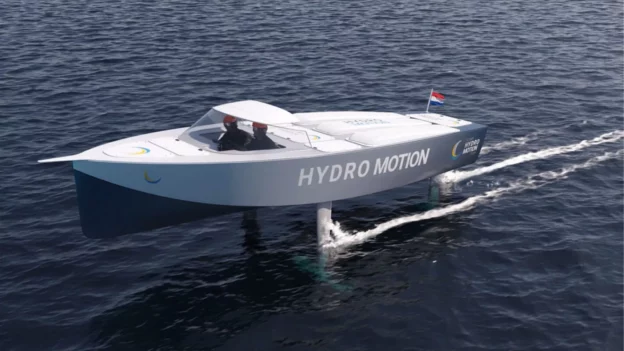The Hydro Motion group, from the Delft University of Technology (TU Delft), has unveiled its hydrogen boat in the NDSM area, Amsterdam . This summer, students plan to make a pioneering voyage across the North Sea using this autonomous boat
Hydrogen Boat Features
Equipped with three propellers and a specially designed hydrogen tank, the ship represents a significant advance in the use of green hydrogen, suggesting a possible transition towards more sustainable fuels in commercial shipping.
Subsequently, the importance of hydrogen in this project is fundamental. This element, when obtained through electrolysis using renewable energies, becomes a completely clean energy vector. Its ability to store more energy compared to traditional batteries positions it as a viable and efficient option for the maritime industry of tomorrow.
Furthermore, the construction of the boat stands out for its innovative approach. The three propellers optimize energy consumption and the hydrogen tank, strategically integrated into the hull, allows long voyages without the need to frequently recharge. With 25 kg of hydrogen , the ship can travel long distances, a crucial factor for ocean navigation.
Hydro Motion’s triumph in Monaco
In turn, the Hydro Motion team is no stranger to recognition, having won the world championship in the Monaco Open Sea competition the previous year with a similar boat. This past achievement has reinforced its determination to validate hydrogen as a feasible and sustainable energy source for the future of shipping.
In planning their trip to London, students face a considerable challenge. The trip, which is expected to last approximately thirteen hours, includes safety measures such as changing pilots every two hours. This voyage will test the ship’s efficiency, and will serve as a demonstration of the team’s perseverance and competence.
The adoption of hydrogen represents a technological advance and an opportunity to reduce the carbon footprint of the shipping industry, which is responsible for a significant portion of global greenhouse gas emissions. Projects like the one at TU Delft drive research and development of new solutions that could profoundly transform this sector.
Follow us on social networks and don’t miss any of our publications!
Inspenet.com YouTube LinkedIn Facebook Instagram X
Source: ecoinventos.com
Photo: hydromotionteam

